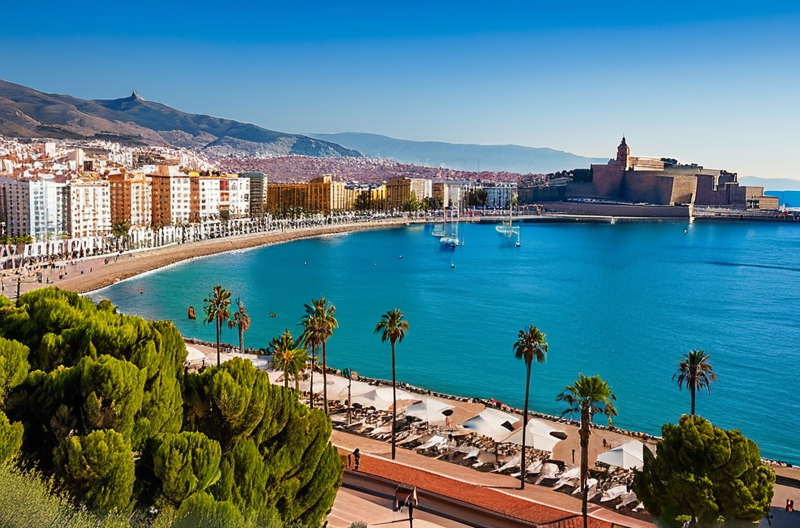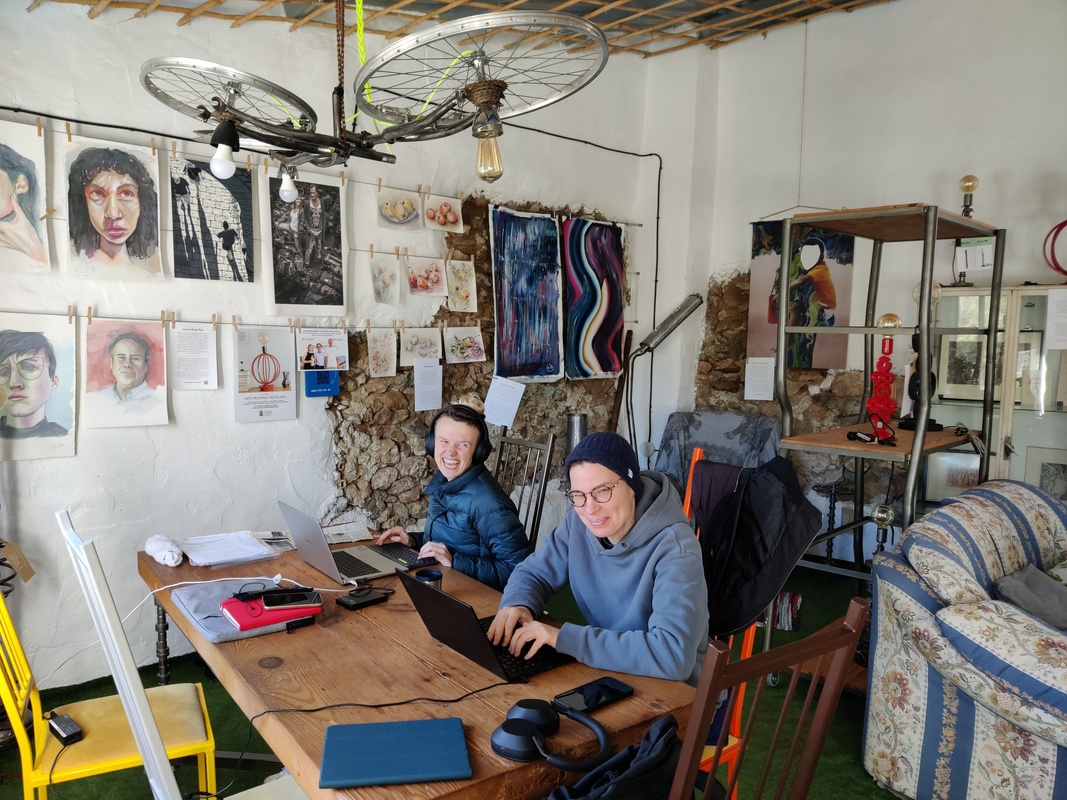Introduction
¡Hola! Welcome to Spain, where lunch doesn't start until 2 PM, dinner happens at 10 PM, and somehow this schedule makes perfect sense once you've been here for a month. If you're thinking about moving here, you've probably already fallen for the Spanish trap – maybe it was that perfect plate of jamón ibérico, the way people actually take siestas without guilt, or just the fact that you can get a glass of wine with lunch and nobody looks at you weird.
I've been living here for five years now, and Spain has this magical ability to make you completely rethink what "normal" life looks like. You'll find yourself taking two-hour lunch breaks, having dinner at 11 PM, and somehow becoming more productive than you ever were when you lived by your old schedule.
But let's be real: Spain will test your patience with bureaucracy that would make Kafka weep, and good luck getting anything done between 2-5 PM when the entire country shuts down. The flip side? You'll discover what work-life balance actually means, make friends who invite you to family weddings after knowing you for three months, and realize that maybe the rest of the world has been doing life wrong this whole time.

The breathtaking Plaza de España in Seville, Spain
Visa Programs
- Tourist Visa (Schengen): 90 days within a 180-day period for non-EU citizens. Ideal for initial exploration.
- Digital Nomad Visa: Spain's newest visa (as of 2023) allows remote workers to live in Spain for 1-5 years with simplified requirements.
- Non-Lucrative Visa: For those with sufficient savings or passive income who don't plan to work in Spain. Valid for 1 year, renewable.
- Student Visa: For those enrolled in Spanish educational institutions. Popular for language learning.
- Work Visa: For those with a job offer from a Spanish company. Requires employer sponsorship.
- Golden Visa: Residence permit for investors who make a significant investment (typically €500,000+ in real estate).
- Family Reunification Visa: For family members of Spanish residents or citizens.
Premium Spain Non-Lucrative Visa Checklist
Planning to apply for a Spain Non-Lucrative visa? Our comprehensive checklist makes the process simple:
- Complete step-by-step application guide
- All required documents listed with examples
- Updated 2025 financial requirements
- Consulate-specific guidance for faster approval
Visa Survival Guide: The Digital Nomad Visa sounds amazing until you see the paperwork requirements. You'll need 6+ months of consistent income proof – and I mean CONSISTENT. That one month where you made €200 because you took a vacation? Yeah, they'll notice.
Pro move: get everything translated to Spanish by a certified translator before you even start the application. Spanish bureaucrats love their official translations, and it'll save you weeks of back-and-forth. Trust me, I learned this the hard way.
Cost of Living
| City | Monthly Cost (USD) |
|---|---|
| Madrid | $1,500 - $2,800 |
| Barcelona | $1,600 - $3,000 |
| Valencia | $1,200 - $2,200 |
| Seville | $1,100 - $2,000 |
| Málaga | $1,300 - $2,500 |
Housing Reality Check: Want to live in the center of Madrid or Barcelona? Hope you enjoy paying €1,500+ for a shoebox apartment. But here's the secret: Spanish public transport is actually amazing, so you can live 20 minutes out and save 30-40% on rent.
Places like Getafe near Madrid or Gràcia in Barcelona give you that local Spanish life without the tourist prices. Plus, you'll actually get to know your neighbors instead of living in an expat bubble.
Tax System

Spain offers special tax benefits for new residents
Key Tax Information for Expats
- Tax Residency: If you stay in Spain for more than 183 days in a calendar year, you're considered a tax resident.
- Tax Rates (2024):
- Up to €12,450: 19%
- €12,451 - €20,200: 24%
- €20,201 - €35,200: 30%
- €35,201 - €60,000: 37%
- €60,001 - €300,000: 45%
- €300,001+: 47%
- NIE (Número de Identidad de Extranjero): Foreign ID number required for all financial transactions, including tax filing.
- Beckham Law: Special tax regime for new residents allowing eligible expats to pay a flat 24% tax rate on Spanish income instead of progressive rates.
- Double Taxation Agreements: Spain has agreements with many countries to prevent double taxation on the same income.
The "Enchufe" System: Here's something they don't teach you in business school – Spain runs on "enchufes" (personal connections). Half the good jobs never make it to job boards because someone's cousin's friend already got the heads up.
Go to networking events, join industry meetups, make friends at the local bar. I know people who got amazing jobs just by chatting with someone at a tapas bar. In Spain, who you know isn't just helpful – it's essential.
Job Market and Salaries
Spain's job market for expats is concentrated in several key sectors, with opportunities varying significantly by region and language proficiency:
- English Teaching: Consistently high demand, especially in major cities. The TEFL certification is typically required.
- Technology: Growing tech hubs in Madrid, Barcelona, and Valencia with increasing opportunities for skilled developers, designers, and project managers.
- Tourism & Hospitality: Abundant opportunities, especially in coastal regions and major cities. Spanish language skills are often required.
- Multinational Companies: Companies like Amazon, Google, and Microsoft have offices in Spain and occasionally hire English-speaking expats.
- Customer Service: International call centers often recruit native English speakers and other language specialists.
Most Popular Nomad/Expat Cities

Madrid
Spain's capital offers excellent infrastructure, world-class museums like the Prado, and a vibrant international business scene. The city's central location makes it ideal for exploring the rest of Spain. Great for: Career-focused expats and culture lovers.

Barcelona
This coastal Catalan city blends stunning architecture, beaches, and a thriving tech scene. Gaudi's masterpieces and Mediterranean lifestyle make it Spain's most popular expat destination. Great for: Digital nomads, creatives, and beach lovers.

Valencia
Spain's third-largest city offers the perfect balance: beautiful beaches, affordable living, futuristic architecture in the City of Arts and Sciences, and fewer tourists than Barcelona. Great for: Families, budget-conscious expats, and those seeking balance.

Málaga
This Costa del Sol gem offers 320+ days of sunshine, beautiful beaches, and a growing digital nomad scene. Picasso's birthplace combines culture with relaxation. Great for: Remote workers, sun-seekers, and retirees.
Pro Tip: To truly experience Spanish culture, adjust your schedule to the local rhythm. Have a light breakfast, a substantial lunch around 2pm, and dinner after 9pm. This alignment with local customs will not only help you avoid empty restaurants during odd hours but also improve your social life and cultural integration.
Culture and Lifestyle

Spain's social culture revolves around food, friends, and relaxation
Spain's lifestyle is characterized by its relaxed pace and emphasis on enjoying life's pleasures:
- Daily Schedule: The Spanish day runs later than in most countries. Lunch (2-4pm) is often the main meal, with dinner rarely before 9pm.
- Food Culture: Food is central to Spanish life, with emphasis on fresh ingredients and social dining. Tapas, paella, and regional specialties vary across the country.
- Siesta: While less common in major cities, many businesses still close for a few hours in the afternoon, especially in smaller towns.
- Socializing: Spain's social culture happens in public—in plazas, cafes, and bars—rather than private homes. Spaniards prioritize family and social connections.
- Festivals: From La Tomatina to Semana Santa to local fiestas, Spain's calendar is filled with celebrations that showcase the country's passion for life.
Entertainment and Activities
Spain offers a wealth of activities for expats to enjoy year-round:
- Outdoor Adventures: From hiking in the Picos de Europa to surfing in the Basque Country or skiing in the Sierra Nevada, Spain's diverse geography offers endless outdoor pursuits.
- Arts & Culture: World-class museums (Prado, Reina Sofia, Guggenheim Bilbao), historic sites, and vibrant performing arts scenes in every major city.
- Sports: Football (soccer) is a national passion. Attending a Real Madrid or FC Barcelona match is an unforgettable experience. Tennis, cycling, and watersports are also popular.
- Food & Wine Tourism: Wine regions like La Rioja and Ribera del Duero offer tastings and tours. Culinary tours and cooking classes are available in most cities.
- Nightlife: Spain's nightlife is legendary, with clubs often not filling until after midnight and continuing until morning, especially in Madrid, Barcelona, and Ibiza.
Pro Tip: For affordable cultural experiences, take advantage of free museum days (many state museums offer free entry on Sunday afternoons or specific weekday evenings) and municipal cultural centers which offer high-quality concerts, exhibitions, and workshops at minimal cost. The "Noche en Blanco" events in major cities also provide free cultural activities all night long.
Tips for New Expats

Remote work from Spanish cafes has become increasingly popular
- Learn Basic Spanish: While English is widely spoken in tourist areas and among younger Spaniards, learning Spanish will significantly improve your experience and integration.
- Patience with Bureaucracy: Administrative processes can be slow and paper-heavy. Allow plenty of time for visa applications, residency permits, and setting up utilities.
- Embrace the Schedule: Adjust to Spanish timing rather than fighting it. Shops often close during siesta (roughly 2-5pm) and many restaurants don't open for dinner until 8pm.
- Get Your NIE Early: This identification number is essential for renting apartments, opening bank accounts, getting a phone plan, and more.
- Join Expat Groups: Facebook groups, InterNations, and Meetup events are great ways to find community and practical advice during your transition.
- Healthcare Planning: Spain has excellent public healthcare, but you'll need to register. EU citizens should bring their EHIC/GHIC cards, while non-EU expats typically need private insurance initially.
- Choose Location Carefully: Each region of Spain has its own distinct culture, climate, and sometimes language. Visit different areas before deciding where to settle.
Spanish is a relatively easy language for English speakers to learn compared to many other languages. Most expats find that even basic Spanish phrases open doors and help build goodwill in daily interactions. Regional languages like Catalan, Basque, and Galician are also spoken in their respective regions, but Spanish (Castellano) is understood throughout the country.
Pro Tip: When learning Spanish, focus first on irregular verbs like "ser," "estar," "ir," and "tener," as these are used constantly in everyday conversation. The language learning app HelloTalk pairs you with native Spanish speakers looking to learn your language for free conversation practice, which is perfect for improving your real-world Spanish skills.
Digital Nomad Resources
Spain has become a top destination for digital nomads, especially with the introduction of its digital nomad visa in 2023. Here's what you need to know about working remotely from Spain:
Internet & Connectivity
Spain offers excellent internet infrastructure, particularly in urban areas:
- Fixed Broadband: Spain ranks well in the EU for fiber optic coverage with average speeds of 150-300 Mbps in major cities
- Mobile Data: 4G/5G coverage is excellent across the country with affordable data plans
- Internet Reliability: Connection quality is consistently good in major cities and tourist areas
- Internet Plans: Starting from €30/month for fiber optic connections (300-600 Mbps)
- Internet Speeds:
- Madrid: 100-600 Mbps average
- Barcelona: 100-600 Mbps average
- Valencia: 100-500 Mbps average
- Málaga: 100-500 Mbps average
Top Coworking Spaces
Spain's major cities offer excellent coworking options:
Madrid
- Impact Hub - Multiple locations, strong community
- Spaces Madrid - Modern facilities, central locations
- Utopicus - Beautiful design, multiple locations
- WeWork - International standard facilities
Barcelona
- Aticco - Rooftop terrace, networking events
- OneCoWork - Prime locations including marina
- Spaces Barcelona - Modern design, multiple locations
- Betahaus - Community-focused space
Valencia & Málaga
- Wayco (Valencia) - Central location, great amenities
- The Cube (Málaga) - Tech-focused space
- The Workshop (Málaga) - Beachside coworking
- La Térmica (Málaga) - Creative atmosphere
Pro Tip: Spain has a vibrant café culture. Many cafés welcome remote workers and offer free WiFi, making them perfect for occasional work sessions. Recommended chains include Café & Té, La Rollerie, and Starbucks.
Popular Digital Nomad Areas
- Malasaña & Chamberí (Madrid) - Hip neighborhoods with numerous cafés and coworking spaces
- Poblenou (Barcelona) - Tech district with innovative spaces and beach proximity
- Ruzafa (Valencia) - Creative neighborhood with cafés and affordable living
- Soho (Málaga) - Arts district close to the beach with growing digital nomad scene
- Las Palmas (Gran Canaria) - Year-round warm weather, affordable living, and nomad community
Friend Bonus Tip REC.ON Spain Ecovillage
REC.ON Spain is an Ecovillage and Coliving Art Residency located in the picturesque village of La Mata Bolaimi, with just 10 houses, nestled in the Sierra Maria-Los Vélez mountains of Andalusia. Founded in 2019 by Bart and Paulina Bielecki, it serves as a pioneering model for revitalizing the over 100-year-old buildings of a former goat farm.
REC.ON Spain is rooted in the values of art, ecology, and conscious community, offering a creative space for artists, writers, digital nomads, and travelers. Whether you're healing from burnout, escaping the rat race, or pursuing a passion project, this ecovillage provides a space to create, reset, reconnect with nature, embrace simplicity and serenity.
Coliving & Coworking in the Ecovillage
The space at REC.ON is designed for digital nomads, travelers, people experiencing burnout and those looking for inspiration and an entry into slow life. They offer coliving rooms, a Green Spot for RVs and coworking spaces for remote work. You can connect with a community of people with similar values. There are opportunities for hiking, meditation or taking part in creative workshops.
Learn more: www.rec-on.es
Expat Communities & Networking
Spain has thriving expat communities in all major cities, making it easy to connect with fellow internationals:
- Facebook Groups: Join active communities like "Expats in Madrid," "Barcelona Expats," "Expats in Valencia," and "Costa del Sol Expats" where members share advice, events, accommodation, and job opportunities.
- Meetup Events: The Meetup.com platform is very active in Spanish cities with regular gatherings for language exchange, professional networking, hiking, and special interests.
- Language Exchanges: "Intercambios" are popular throughout Spain and offer opportunities to improve your Spanish while helping locals with English or other languages.
- Professional Associations: Organizations like the American Club of Madrid, British Chamber of Commerce, and other country-specific chambers host networking events for professionals.
- Sports Clubs: Join football leagues, hiking groups, tennis clubs, or yoga communities to stay active while expanding your social circle.
One of the major advantages of living in Spain is the open social culture, which makes it relatively easy to make connections, especially if you make an effort to learn some Spanish and participate in local activities.
Spanish Language Resources
While English is widely spoken in tourist areas and among younger Spaniards, learning Spanish will significantly enhance your experience in Spain:
- Recommended Learning Resources:
- Apps: Duolingo, Babbel, SpanishDict, and Memrise
- Online Courses: SpanishPod101, italki (for finding tutors), Lingoda
- Books: "Madrigal's Magic Key to Spanish," "Practice Makes Perfect: Complete Spanish Grammar"
- Useful Everyday Phrases:
- Hello: Hola (OH-lah)
- Thank you: Gracias (GRAH-see-as)
- Please: Por favor (por fah-VOR)
- How much?: ¿Cuánto cuesta? (KWAN-toh KWES-tah)
- Delicious: Delicioso (deh-lee-SYOH-soh)
- Nice to meet you: Encantado/a (en-kahn-TAH-doh/dah)
- Language Schools in Major Cities:
- Madrid: Cervantes Escuela Internacional, AIL Madrid, Enforex
- Barcelona: Don Quijote, Speakeasy, BCN Languages
- Valencia: Hispania Valencia, Taronja School, Costa de Valencia
- Málaga: Cervantes Escuela Internacional, CLIC International House
Spanish is a relatively easy language for English speakers to learn compared to many other languages. Most expats find that even basic Spanish phrases open doors and help build goodwill in daily interactions. Regional languages like Catalan, Basque, and Galician are also spoken in their respective regions, but Spanish (Castellano) is understood throughout the country.
Pro Tip: When learning Spanish, focus first on irregular verbs like "ser," "estar," "ir," and "tener," as these are used constantly in everyday conversation. The language learning app HelloTalk pairs you with native Spanish speakers looking to learn your language for free conversation practice, which is perfect for improving your real-world Spanish skills.
The Real Deal
Here's the truth about Spain: it's going to drive you absolutely crazy with paperwork that makes no sense, schedules that seem designed by night owls, and a language that you'll swear you're getting better at until someone from Andalusia starts talking at normal speed. But then you'll find yourself having three-hour lunches without guilt, making friends who treat you like family after knowing you for a week, and actually understanding what "work-life balance" means.
Spain will change how you think about time, relationships, and what really matters in life. You'll stop checking your phone during meals, start talking to your neighbors, and discover that maybe rushing through life isn't actually the point. The bureaucracy will still suck, but you'll learn to embrace the chaos.
Fair warning: Spain is addictive. You'll start planning your entire life around staying here, and "just a year abroad" will turn into "well, maybe I should get permanent residency." Don't say I didn't warn you when you find yourself defending the Spanish schedule to confused friends back home. ¡Bienvenidos a España! You're going to love it here, even when you're complaining about it.





